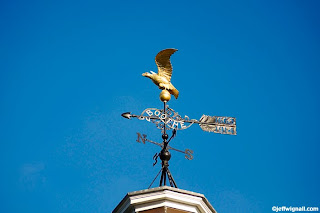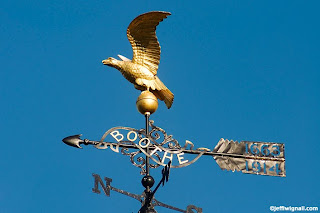
 If there's one thing (optically speaking) that DSLR photographers always want more of it's a longer telephoto range. Even with the long telephoto lenses available (300mm is common with zoom lenses) and the fact that these lenses are even more powerful on a camera with a cropping factor, there's always a desire to have longer and longer lenses. And for certain types of photography like wildlife and sports, big telephoto lenses are a huge help, no question. It's nice to be able to fill the frame with a songbird across the yard, or a third-baseman across the field.
If there's one thing (optically speaking) that DSLR photographers always want more of it's a longer telephoto range. Even with the long telephoto lenses available (300mm is common with zoom lenses) and the fact that these lenses are even more powerful on a camera with a cropping factor, there's always a desire to have longer and longer lenses. And for certain types of photography like wildlife and sports, big telephoto lenses are a huge help, no question. It's nice to be able to fill the frame with a songbird across the yard, or a third-baseman across the field.The problem is that once you get past the 300mm range in a zoom or straight telephoto lens, you're getting into some very expensive pieces of glass. A good quality 600mm lens can set you back around ten grand--yikes! I'd rather put a down payment on a condo in Florida than spend that kind of money on a lens. But there is a relatively inexpensive alternative: telephoto converters. A converter is a tube with glass elements that fits between your existing lens and magnifies the telephoto range of the lens. Typically these converters come in either a 1.4x or 2.0 power (and magnify the focal length accordingly); so with a 300mm lens and a 1.4x converter, you have, in effect, a 420mm lens. No we're rocking! But now add in the 1.5x copping factor that is common on many DSLR camera bodies and you're looking at (or through) a 630mm lens! Fantastic.
The great thing about converters, as I said, is that they only cost a fraction of the price of an equivalent lens. I shot the second of the two photos above with a Kenko Teleplus Pro 2.0 converter on a Nikkor 70-300mm f/5.6 lens set at 230mm (in 35mm terms)--the equivalent of a 460mm lens. How cool to be able to double the focal-length of the lens I was using by slipping a converter onto the camera--it takes literally just a few seconds to do. B&H sells the Kenko converter for around $220.
Are there any drawbacks to converters? Yes. One is that there is some potential degradation of sharpness and the degree really depends on the quality of the converter. To be honest I didn't notice any measurable loss in sharpness with the Kenko--in fact, I found it to be supremely sharp if you lock the camera down on a good tripod. (The photos here are sharper than they look online, by the way, the online compression strongly affects sharpness--never judge the quality of an image by its online reproduction.) There is no way to get a sharp photo with a 460mm lens without a tripod--not going to happen. Some photographers complain about a lack of sharpness with converters but neglect to mention they're trying to handhold enormous lenses. Also, any time you use a longer lens you're going to lose depth of field (it's just an optical fact) and I think some photographers see that lack of DOF as a lack of sharpness--they're not the same thing.
Keep in mind though, the longer the lens you're starting with and the more converter power you add, the more likely you are to see some loss of sharpness. Is the loss a deal breaker? No way. You can more than make up for any softness in editing, again, provided you used a good tripod and a fairly fast shutter speed. If it comes down to not getting the shot or getting shot and having to sharpen it later, I prefer to get the shot.
There is a loss of about a stop of light with all 1.4x teleconverters (about two stops with a 2.0 converter) and that's just part of the price you pay to get a longer lens. It's simple to overcome the loss of a stop if you need it by just doubling the ISO--from 200 to 400 for example--and that buys you back the lost stop. You might notice some slowness of focus with any teleconverter and I do notice that at times, but if you find a good edge to focus on, it's not much of an issue.
Finally, one of the best things about a teleconverter is that it will fit in your jeans pocket. If you're out hiking and you are carrying a 70-210mm or 80-300mm lens, you can double that range with something that fits in your pocket. Yes, you might lose a bit of sharpness and you will lose some light, but when you compare the weight, cost and convenience factors, it's hard to ignore the beauty of a good-quality converter.






2 comments:
This is too funny. I got to try my converter recently and took the exact same shots. Boothe is a great place for trying out new things.
I'm telling you Mike, great minds think alike. When I needed to test that converter, my mind went to that weather vane. Probably only the photographers in Stratford even notice it. Boothe is a real treasure for this town, that's for sure.
Post a Comment